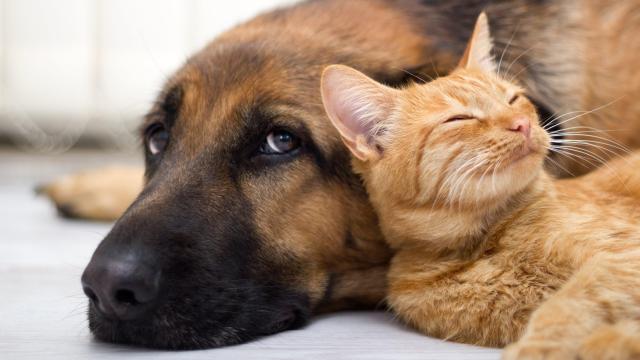Pets are lucky they’re (usually) cute, because humans will go to all kinds of lengths to keep them happy, healthy and comfortable. Sure, that’s your favourite chair, but it’s also your dog’s favourite chair, and once she looked you in the eyes and sighed, you gave in and let her have it. That kind of thing.
But another part of having a pet is understanding the potential risk of getting sick because you’ve picked something up from your dog, cat or bird. A recent article in Real Simple describes some of the most common conditions spread by pets, and what you can do to avoid getting sick.
Roundworm and hookworm
Yes, roundworm and hookworm are very common in pets — and that’s exactly why Sally Haddock, DVM, founder of the St. Marks Veterinary Hospital in New York, says that we have to take both conditions seriously in order to prevent an outbreak in our homes.
In addition to using common sense (like washing your hands after touching your pet, and not letting your pet lick you in/on/around your mouth) and getting your pet treated as soon as they’re diagnosed with either roundworm or hookworm, Haddock stresses the need to thoroughly disinfect your home to prevent it from spreading. “You want to vacuum and throw out the vacuum bag,” Haddock tells Real Simple. “We usually tell people one part bleach to ten parts water solution on floors to try to kill the spores.”
Toxoplasmosis
This single-cell parasite that lives in undercooked meat can cause symptoms in pregnant people and those who are immunocompromised, according to the Centres for Disease Control and Prevention. The most common way it’s transmitted from pet-to-human is when people come in contact with their pet’s stool. And though both dogs and cats can contract this parasitic infection, it’s more common among cats, according to a 2019 article in the journal Frontiers in Veterinary Science.
“You can get stool on you when you’re cleaning the litter box or petting your cat because they can have microscopic pieces of stool that hang on to them, especially if they’ve had diarrhoea,” Haddock explains, “and then it sticks on the skin and dries.” This is why it’s important to change your cat’s litter box regularly (Haddock recommends doing it daily) and always washing your hands after touching your pet (and obviously, after any contact with their poop).
Psittacosis
Some pet birds — especially parrots, macaws, cockatiels and budgerigars — can be infected with a type of bacteria called Chlamydia psittaci. It can also affect live poultry, like chickens, ducks and turkeys. This bacteria can make its way to humans, causing an illness called psittacosis, which typically comes with flu-like symptoms.
Along with the usual advice of washing your hands immediately after touching a bird, Haddock recommends that people clean out their bird’s cage twice a day so the bird’s stool doesn’t have a chance to harden. Hard bird poop is bad news, she says, because when the birds flap their wings, “the bacteria becomes aerosolised.” No, thank you.

Leave a Reply
You must be logged in to post a comment.